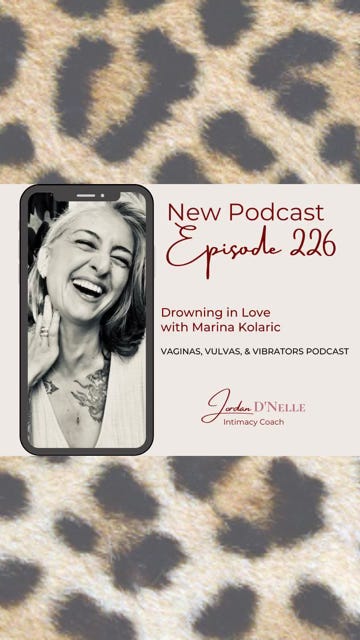“Addiction is not a choice that anybody makes; it’s not a moral failure.
What it actually is: it’s a response to human suffering.”
I was recently a guest at the Vaginas, Vulvas & Vibrators podcast with a beautiful and talented pleasure advocate and sexual health educator, Jordan D'Nelle. Her podcast is designed to give women a place to learn about women's health and sexual wellness. It covers topics that are relevant to learning how women's bodies work and how to improve one’s intimate life.
Jordan read my Substack post on sex and love addiction and invited me to be her guest and chat about one of my favorite topics. As most of you may know, addiction, along with obsessive and compulsive behaviors, can extend beyond substances to various habits and patterns. In this podcast episode, the two of us are exploring the complexities of sex and love addiction - with a little bit more focus on love addiction. Topics include the psychological and physiological aspects of addiction, its negative impacts such as denial of personal needs and abusive relationships, the importance of self-awareness and self-care for recovery, just to name a few.
“The challenge for human beings is not how to avoid suffering, but how to face the pain that is inherent in our lives, and how not to create more suffering by our desperate attempt to avoid pain. Addiction is, perhaps, the most desperate measure we employ to escape suffering.”
~ Valerie Mason-John, Eight Step Recovery: Using the Buddha's Teachings to Overcome Addiction

It can be difficult and challenging to realize and admit to yourself that you might be struggling with sex and love addiction, especially when these behaviors are still stigmatized even among the people who struggle with other forms of addiction - let alone the rest of the population. Maybe you are uncertain about the ways you show up in romantic and sexual relationships, or you may be wondering how come you tend to choose partners who are abusive. The way you forget about yourself and your needs when you are in a relationship may be of concern for you. You may notice that you tend to fully adapt to your partner’s expectations instead of staying true to yourself. Some of these questions and concerns we covere more in detail in this podcast.
Many people tend to think that sex and love addiction is not “a real” addiction; although it does seem to manifest in the same vicious cycle as any other obsessive/compulsive behavior. If you think this could be you, it is important to take it seriously and find an adequate help and support. I personally found that having a regular therapy helps tremendously - in getting to know myself better, in becoming aware of my own old wounds and conditionings, in recognizing where I am responsible for my life, and also in starting to love myself more. Additionally, being a part of a community of likeminded people where you can be seen and understood - be it a 12 step recovery, a Buddhist recovery, or any other recovery approach - can be a great support.
Some of the questions we cover in this podcast episode…
What is sex and love addiction?
How do we recognize it?
How does consent play in all this?
Can I be under the influence and consent?
How is addiction to love self-harming?
How much harm can we cause to ourselves and others when we mindlessly engage and/or objectify others?
Where is the line between sex positivity and objectification?
Everything points out that recovery - recovering the long lost connection to our deepest true self - starts with becoming aware of what is going on; it starts with deeper self-awareness. We get to finally know ourselves, and slowly accept - and even love - all of those parts of us, especially the ones we don’t like, the ones that are not socially acceptable or in demand. We get to be present to what is happening within - with compassion and curiosity, instead of judgment and criticism. As Dr. Gabor Mate beautifully puts it: “Addiction is always a poor substitute for love.” We need to learn to love ourselves - to mother and nurture ourselves - and to give to ourselves all that which we haven’t received in the past, and which we desperately expect, and even demand, from others.
“Not every story has a happy ending, … but the discoveries of science, the teachings of the heart, and the revelations of the soul all assure us that no human being is ever beyond redemption. The possibility of renewal exists so long as life exists. How to support that possibility in others and in ourselves is the ultimate question.”
As always, I am grateful for you reading me, following me, and for your subscription!
If you feel inspired or moved, if you feel seen or heard, or if you find my offerings in any way relatable, you can offer me a tip! PayPal me or Venmo me.
You can also upgrade your subscription to a paid membership.
Stay safe.
A hui kaua (Until we meet again),
Marina




